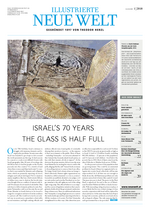The life projects of a Western European, especially a German or Austrian Jew compared to a Russian one early in 20th century could not be more different. In the West, Jews were represented in all occupations, they could be craftsmen or politicians, doctors or lawyers, bankers and industrialists. They could marry into aristocracy, become Protestant, Catholic or stay Israelites, be politically loyal to the emperor, conservative, liberal, social democrats or communist revolutionaries. Civil liberties and rights were secured for them, they could live where they liked. They could acquire wealth, virtually none of them belonged to the proletariat. Even the small tradesman, who sometimes lived at the verge of poverty, was proud of being “independent” and saw himself as belonging to the middle class. Jews were all – albeit only peripherally - part of the greater ascending society. They had, above all, the justified hope that their children could rise. In Russia, things were different.
There, their residences were restricted to certain areas, Jews were, if not always, so often enough, exposed to pogroms and to a more intense and ruthless russification policy resulting from an aggressive Orthodox religiosity. There were discriminatory restrictions barring the access to educational institutions – especially to universities. No matter what professions they practiced, they always stayed at the bottom of society and never were allowed to attain a higher social status.
Jews were practically completely excluded from federal administration and even political decision making. Politically, they had no different orientation than overthrowing Tsarism and the revolution. Within the revolutionary movement, Jewish associations had different goals. The Zionists e.g. demanded: freedom to emigrate. By contrast, the main objective of the strongest faction, the Bund, was to unite all Jewish workers in a socialist party. The Bund wanted to join forces with the Russian Social Democracy to obtain socialist and democratic changes in Russia. Their aim was to gain the legal recognition of Jews in Russia as a separate nation with minority status. It tried to endorse these concepts in Soviet Russia as well. As a secular party it criticized the „reactionary nature of traditional Jewish life in Russia „ and stubbornly resisted Zionism, with the argument that the emigration to Palestine was a form of escapism. The Bolshevik Revolution and above all Lenin were friendly to the Jews - however not to the Bund, which they viewed as a politically competing organization. Any ethnic group or minority persecuted by the Tsarist regime was automatically considered anti-Tsarist and reliably revolutionary. Thus, minority members such as Poles (Dzerzinsky) or Georgians (Ordchonikize, Stalin) and also Jews (Trotsky, Semyonov, Litvinov) were represented in prominent functions in the Bolshevik party.
After Stalin came to power the climate changed. The reality of the Stalinist Soviet state was soon disappointing – if not fatal - not only for farmers, workers, intellectuals, democrats and Mensheviks, but lastly also for the Jews. According to the principle of the peoples’ self-determination it seemed only logical to grant the Jews the status of a people.
Stalin thus conferred to them their own settlement area – Birobidjan – somewhere nowhere, at the farthest confines of hostile Siberia. It wasn’t a Gulag, but not much less. In the end, Stalin ‘s murderous policy culminated in the anti-Semitism that was cloaked as cosmopolitism and enacted in the show trials of the Russian post-revolutionary period as well as after the end of civil war.
Surprisingly, communism of Stalinist coloration has fascinated many Jews in Western Europe, also in Austria. Less the workers than the intellectuals, whose ecstatic self-castration is best expressed in Egon Erwin Kisch’s dictum: “Stalin thinks for me“, when Friedrich Torberg questioned him about the Hitler-Stalin pact.
After the Second World War, many communists among the exiled Jews propagated the return to Austria, in order to rebuild a new, free Austria; they meant of course a communist Austria in line with the Soviet model. And with the bait of antifascism they succeeded to secure a strong position within the Jewish community, with the intention to use it as an organizational platform for a broad mass-movement. The Cold War thwarted this intention. The extraordinarily and elaborately designed bilingual exhibition catalog is more than a guide; it has treated the subject in a very impressive and almost exhausting way.
